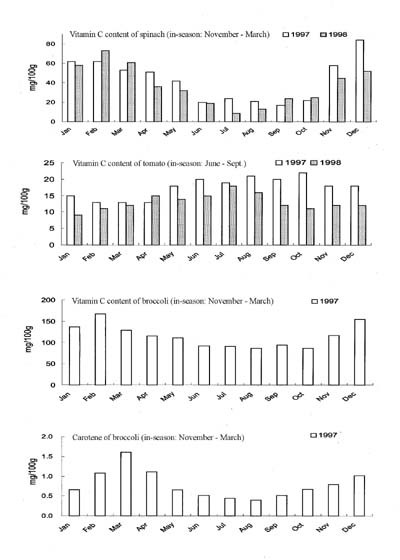Better Nutrition from Vegetables in Season
时间:2017-06-12 来源:LianHui浏览次数:151
Abstract
Seasonal Vegetables in Temperate Countries
In temperate countries, each season used to produce specific vegetables and fruits, such as tomatoes in summer and spinach in winter. These days, however, technical developments have made it possible to cultivate these crops during the off-season under structures, with the help of plastic films and heating. Consumers, especially those living in urban areas, have begun to forget in which season these crops are cultivated out in the field.
It is true that the year-round supply of vegetables and fruits gives us the pleasure of eating these at any time of the year. But we should remember that some of these off-season vegetables and fruits are quite poor in their nutritive value, in spite of their good appearance and higher price ( Table 1(554)). Studies in Japan have shown us some such examples.
Vitamin Content of off-Season Vegetables
The content of VITAMIN C seems to be significantly influenced by the cropping season. In spinach, for example, the vitamin-C content was reduced by 1/5 to 1/8 in off-season produce, in comparison with its peak in in-season produce. It was also reduced in tomato and broccoli by up to one half in off-season produce.
The content of CAROTENE, a preceding substance of vitamin A, was also affected by the crop season. In off-season broccoli, it was reduced by 1/4, and in off-season carrot, it was reduced by more than half, compared to the one-peak level in in-season produce.
On the other hand, the vitamin C and carotene content of some vegetables and fruits, such as sweet pepper, celery and kiwifruit, was fairly stable in different seasons.
Thus, in order to take in more vitamins in our daily diet, and also for economic reasons, it is recommended to choose in-season vegetables, especially spinach, broccoli, tomato, carrot and cabbage, rather than off-season ones.
Judging from the wide variation in nutritive values between in-season and off-season vegetables and fruits, it is recommended to choose an appropriate value depending on the season in calculating the nutritive value of any diet. The standard table of nutritive value of raw materials, therefore, should be revised based on current seasonal analysis of produce in markets.
Index of Images

Table 1 Nutrient Value of Vegetables in Season and during the off-Season
 English
English 简体中文
简体中文


